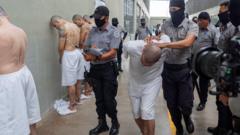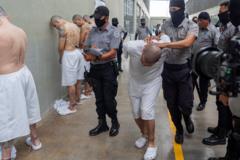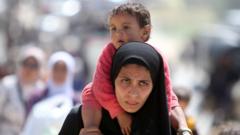The ongoing legal struggle surrounding the deportation of Venezuelan migrants accused of gang affiliations marks a critical confrontation between the Trump administration's executive power and the judicial system. On April 1, 2025, attorneys representing the migrants contended that a lower court's temporary block is essential to prevent the deportation of hundreds of individuals to a notorious prison in El Salvador. This situation raises significant human rights concerns regarding the treatment of deportees.
Venezuelan Migrants Urge Supreme Court to Halt Deportation Plan

Venezuelan Migrants Urge Supreme Court to Halt Deportation Plan
Legal representatives for Venezuelan migrants are appealing to the Supreme Court to maintain a suspension on President Trump's deportation initiative, which they argue contravenes Congressional limits on wartime authorities.
In a recent brief, the American Civil Liberties Union and Democracy Forward stated that this hold is currently the only safeguard keeping the migrants from being sent to a prison, described as one of the most brutal globally, where human rights abuses are reportedly widespread. With over 130 Venezuelan men already deported from the U.S. to El Salvador, the attorneys argued that the absence of procedural justice could lead to deportees facing dire circumstances.
This case is seen as a significant test of Trump's executive actions, exemplifying the ongoing clash between different branches of government. While the Supreme Court's emergency docket typically avoids public hearings or oral arguments, the implications of their decision could influence future immigration policies and reflect broader societal debates on human rights and deportation practices. This situation illuminates the intricate balance between national security and the rights of individuals within the judicial framework.
In summary, the legal battle over the deportation of Venezuelan migrants reveals the complexities of U.S. immigration policy and human rights, emphasizing the importance of judicial review in matters involving vulnerable populations at risk of inhumane treatment abroad.
This case is seen as a significant test of Trump's executive actions, exemplifying the ongoing clash between different branches of government. While the Supreme Court's emergency docket typically avoids public hearings or oral arguments, the implications of their decision could influence future immigration policies and reflect broader societal debates on human rights and deportation practices. This situation illuminates the intricate balance between national security and the rights of individuals within the judicial framework.
In summary, the legal battle over the deportation of Venezuelan migrants reveals the complexities of U.S. immigration policy and human rights, emphasizing the importance of judicial review in matters involving vulnerable populations at risk of inhumane treatment abroad.






















